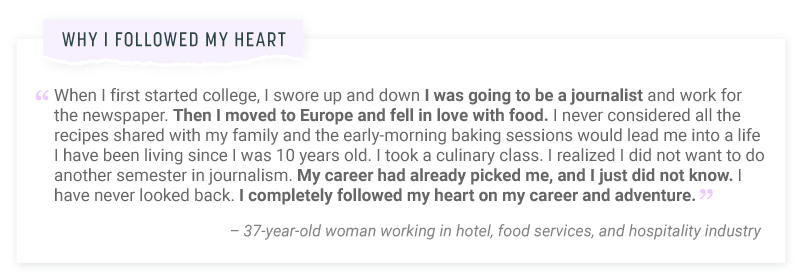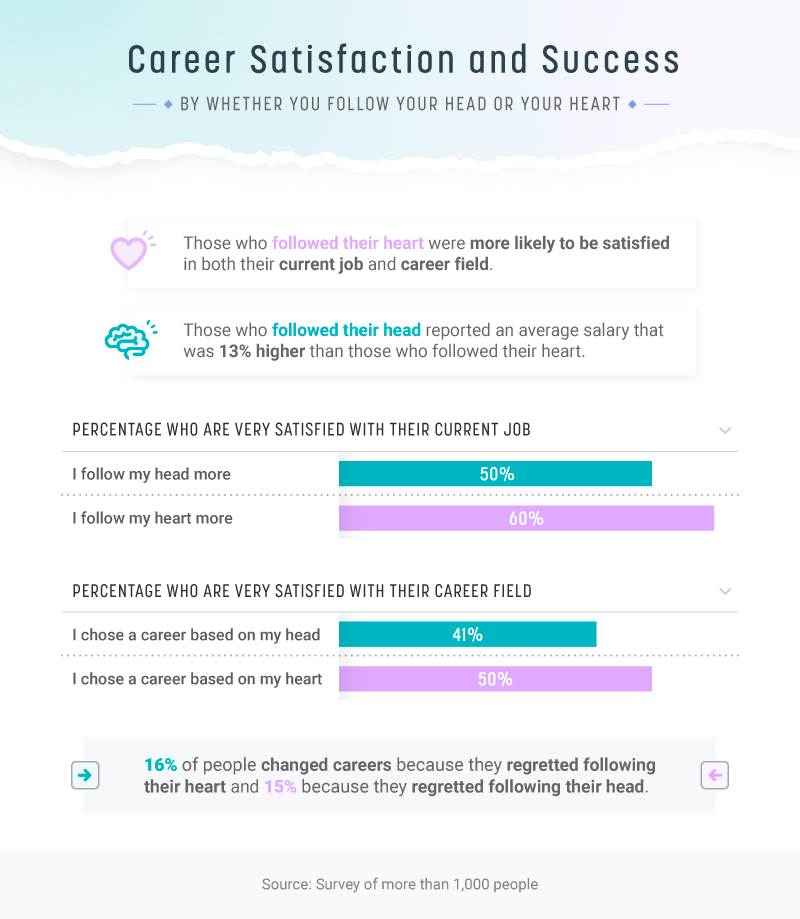MedicalAlertBuyersGuide.org is an independent review site. We may earn compensation from the providers below. Learn More
Following Your Head vs. Your Heart

You’re faced with two job offers – one that makes sense, one that makes you happy. A prestigious company offers you a position with a salary twice as much as you’re currently making and a benefits package that will set you up for life, while the company of your dreams offers you a position in which you can carry out your passions. The clock is ticking, and a decision has to be made. So, which do you choose? The logical choice or the emotional one? You have to choose – follow your head or follow your heart?
As much as we’d all like to think there is an easy answer to such scenarios, the relationship between cognitive and emotional thinking puts decision-making smack in the middle of a gray area. Research has shown that decisions are made through a combination of both cognition and emotion but, science aside, most people tend to think one is better than the other. As for the scenario above, listening to your head may lead to more tangible success, but not following your heart increases the risk of regret.
We surveyed over 1,000 people, gathering information about their decision-making processes, to see how often people rely on their head versus their heart. Do people tend to follow their heart for general decisions but their head for career-related ones? Is their satisfaction impacted by the route they choose? Keep reading to find out.
Millennials Were the Group Most Likely to Follow Their Heart

Most people don’t think too much about general daily decisions. What to wear in the morning, which item to pick up from the store, and what to eat for dinner – daily decisions often seem like tedious and simple no-brainers, but every single choice we make involves both emotions and logic. Yet, when asked about general decision-making, an overwhelming majority of people said they follow their head.
However, baby boomers were the most likely to say so: Compared to 77% of millennials and 80% of Gen Xers, 84% of baby boomers said they follow their head when making general decisions. Some may argue that the older are wiser and therefore more logical, but it seems to be less about experience and more about a generational shift. Millennials were raised in a society where more value was placed on emotions. Self-care, work-life balance, and emotional intelligence are pillars in the younger generations, and when it comes to decision-making, emotion and thought are equals.

Millennials’ emphasis on emotions carries over to the working world, albeit slightly less. On average, 88% of people said they follow their head when making work-related decisions, and millennials were once again the least likely to do so. Compared to 87% of millennials who said they follow their head, a whopping 93% of baby boomers chose a more logical approach.

Decisions aren’t created equally, and the way we approach them isn’t either. People may tend to use their head in a variety of general decisions, but when it comes to specific scenarios, sometimes the heart wins. Purchasing a home, retiring, and accepting a new job were the top three decisions in which people chose to use their head. While just 7% of people followed their heart when deciding whether or not to purchase a home, 93% used their head. Similarly, 86% and 85% of people used their head when deciding whether to retire and whether they should accept a new job, respectively.
On the other end of the spectrum, choosing a romantic partner was the decision people said was best made with one’s heart. Choosing a vacation spot or figuring out whether one should pursue a dream were also decisions in which the majority said following one’s heart was best. Of course, some decisions left people split. When deciding whether or not one should get a pet or start a family, 58% said they would follow their head, and 42% said they would follow their heart.
It’s no surprise people are split on these lifelong decisions, considering owning a pet and starting a family tend to be moves that involve equal parts emotion and logic. While people need to consider their emotional readiness when getting a fluffy companion or bringing another life into the world, they also need to consider finances and feasibility – making it nearly impossible not to use both their head and their heart.
Following Your Head Comes With Age

Choosing a career path can be less permanent than bringing home a pet or starting a family, but the decision is no less difficult. Entering the workforce, most people hear how important it is to “follow your heart,” or to “do what you love,” but the majority of people don’t seem to heed the advice. The majority of people across all ages said they used their head when choosing a career, with the likelihood increasing with age. Compared to 74% of those aged 60 and older, only 61% of respondents in their 20s said they choose their career by following their head.

Millennials’ emphasis on emotions, morals, and values could explain why younger respondents were the most likely to choose a career by following their heart. Millennials were raised in a culture that taught them to follow their dreams and pursue their passions (ahem, “do what you love and you’ll never work a day in your life”) and they stand by it so much that they’ve begun to pass the advice on to others.
But the clichéd advice to “follow your heart” isn’t for everyone. Depending on the industry, people are more likely to think analytically about their decisions, while others naturally follow their intuition. Employees in the finance and insurance industry were the most likely to choose their career by following their head, while those in the arts, entertainment, and recreation industry were significantly more likely to choose by following their heart.

Regardless of industry and age, research says following your passion hinders success – and the public agrees. A whopping 64% of people believed it’s better to choose a career based on one’s head than one’s heart if they want to be successful, while 68% agreed that following one’s heart when making business-related decisions could cloud their judgment.
Following Your Heart Leads to More Satisfaction

However, success is not all about monetary value. Enjoying the work you do is also a vital factor in determining someone’s level of success, and hating your job can actually cost you. Lack of sleep, frequent headaches, muscle aches, declining mental health, compromised immune system, and various other ailments can all arise due to workplace stress and low job satisfaction.
Following your head may put more money in your pocket, but following your heart is significantly more likely to lead to job and career satisfaction. While only half of respondents who followed their head more often said they were very satisfied with their current job, 60% of those who tend to follow their heart said the same. Similarly, only 41% of people were satisfied with their career field after choosing with their head, while 50% of people said the same after choosing with their heart.
There’s no denying following your heart comes with risk, but according to our findings, following your head is nearly as risky. While 16% of people changed careers because they regretted following their heart, 15% made a change because they regretted following their head.
Decisions Made Easy
Although decision-making is not fully understood, research has shown that emotions play a role in nearly every choice we make. Whether it’s deciding which brand of olive oil to purchase or what career path to choose, making a decision requires both emotional and cognitive thinking. However, for some decisions – like purchasing a home, retiring, and accepting a job – people tend to follow their head. But for other, more sentimental decisions, like choosing a romantic partner, people tend to listen to their heart.
The way we make decisions may change throughout our lives or depend on the specific scenario, but regardless of preference, there truly is no right or wrong answer. Emotions drive many of our thoughts and actions, and it’s OK to let them influence decisions. But when it comes to vital, life-changing decisions, gathering the facts is equally important.
Choosing a medical alert system is one of those vital, life-changing decisions, and at Medical Alert Buyers Guide, we know how emotional the decision can be. That’s why we’ve done the research for you. Our team of medical alert industry experts has thoroughly reviewed the best products in the market and is here to assist your family in choosing the right device that could ultimately save your loved one’s life. To learn more, visit us online today.
Methodology
We collected responses from 1,011 people from a survey about decision-making processes and whether we more often follow our head or our heart. Respondents were provided with a definition of following one’s head as analytical or cognitive thinking and a definition of following one’s heart as emotional or affective thinking. Fifty-three percent of respondents identified as female, and 46% of respondents identified as male. Less than 1% of respondents identified as a gender not listed on our study. Participants ranged in age from 18 to 76 with a mean of 38 and a standard deviation of 12.2. Fifty-eight percent of respondents were millennials, 26% were from Generation X, and 13% were baby boomers. Three percent of respondents identified as another generation.
Limitations
Industries were limited to results with 50 or more respondents. No statistical testing was performed and, as such, this content is exploratory. Data relies on self-report and is subject to exaggeration or misrepresentation.
Fair Use Statement
Do you have a friend who tends to throw caution to the wind and follow their heart? Or a loved one who has to have a rational explanation for every decision? They may be interested to see how their decision-making tactics measure up. You’re welcome to share our findings – the graphics and content found here are available for noncommercial reuse. All we ask is that you include a link back to this page so readers can get all the information and the authors can receive proper credit.

